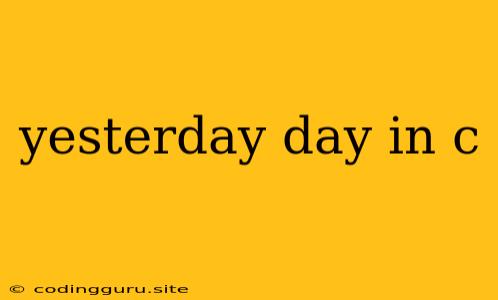Understanding "Yesterday" in C Programming
In the realm of C programming, handling time and dates can be a bit tricky. While C provides functions for working with time, it doesn't have a built-in mechanism for directly calculating "yesterday." However, with a little cleverness and some understanding of C's time functions, we can achieve this functionality.
Let's dive into the process of finding "yesterday" in C.
The Core Function: time() and localtime()
At the heart of our "yesterday" calculation lies the time() function. It returns the current calendar time as a time_t value, which is essentially a numerical representation of seconds since the Unix epoch (January 1, 1970 at 00:00:00 UTC).
Once we have this time value, we can use the localtime() function to convert it into a human-readable structure called tm. The tm structure holds various components of a date and time, such as:
tm_year: Year (since 1900)tm_mon: Month (0 - 11)tm_mday: Day of the month (1 - 31)tm_hour: Hour (0 - 23)tm_min: Minute (0 - 59)tm_sec: Second (0 - 59)
Calculating "Yesterday"
With the time() and localtime() functions as our foundation, here's how to calculate "yesterday":
-
Get Current Time: Use
time()to retrieve the current time as atime_tvalue. -
Convert to
tmStructure: Convert thetime_tvalue to atmstructure usinglocaltime(). -
Decrement the Day: Subtract 1 from the
tm_mdayelement of thetmstructure. This effectively moves us to "yesterday." -
Handle Month/Year Boundaries: If
tm_mdaybecomes 0, it means we've crossed into the previous month. Adjusttm_mdayto the appropriate last day of the previous month, and decrementtm_monby 1. Iftm_monbecomes -1, we've crossed into the previous year. Adjusttm_monto 11 (December) and decrementtm_yearby 1. -
Reconstruct Time: Use
mktime()to convert the modifiedtmstructure back into atime_tvalue. This gives us a time representation for "yesterday."
Example Code
#include
#include
int main() {
time_t current_time = time(NULL);
struct tm *current_tm = localtime(¤t_time);
// Get "yesterday"
current_tm->tm_mday -= 1;
if (current_tm->tm_mday == 0) {
current_tm->tm_mday = 31;
current_tm->tm_mon -= 1;
if (current_tm->tm_mon == -1) {
current_tm->tm_mon = 11; // December
current_tm->tm_year -= 1;
}
}
time_t yesterday_time = mktime(current_tm);
// Print "yesterday"
printf("Yesterday was: %s", ctime(&yesterday_time));
return 0;
}
Key Points to Remember
- Timezone Awareness: The
localtime()function uses your system's timezone settings. Be mindful of this when working with dates and times. - Leap Years: When dealing with February, remember to account for leap years.
- Time Zones: If you need to handle time zones differently, consider using the
gmtime()function to get the time in Coordinated Universal Time (UTC), and then manually adjust for your desired timezone.
Conclusion
Finding "yesterday" in C requires a bit of manipulation with time functions. By understanding the core principles of time(), localtime(), and mktime(), you can confidently calculate and represent "yesterday" in your C programs. Remember to handle month and year boundaries, and consider potential edge cases such as leap years and timezones.
